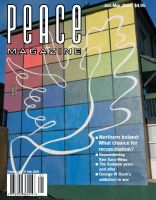
Peace Magazine Jan-Mar 2006, page 31. Some rights reserved.
Search for other articles by PMag staff here
On December 2, the military junta in Burma extended yet again the detention of Nobel Peace Prize laureate Aung San Suu Kyi. She has been detained since May 2003, when thugs affiliated with the government attacked her convoy. She had already spent years under arrest earlier. The regime did not charge her with any offence, but absurdly claimed to be holding her for her own protection.
When parliamentary elections were held in May 1990, her National League for Democracy party won 392 of the 485 seats, but the junta refused to recognize the election results. Daw Suu and about 1100 other Burmese were arrested merely for having expressed their political views peacefully.
The announcement of further detention came as a shock to the ASEAN nations, which had accepted Burma as a member in 1997, hoping that "constructive engagement" would induce the dictators to adopt more democratic approaches. That hope was not fulfilled. Until now, ASEAN has maintained a policy of non-interference in the internal affairs of member states but was deeply embarrassed by the human rights violations in Burma.
On December 12, therefore, at a Kuala Lumpur meeting, ASEAN announced its intention to send a delegation to Burma to assess the situation there. Previously the junta had refused entry to UN envoys with a similar mission. However, this time they stated that the ASEAN delegation would be permitted to meet with Daw Suu.
During the Kuala Lumpur meeting, President Gloria Macapagal-Arroyo of the Philippines proposed to bring the issue before the UN Security Council. She engaged in a lengthy discussion with General Soe Win, the Burmese chief. Apparently capitulating to her criticism, as well as to demands ofASEAN, Secretary General Kofi Annan, and fourteen other Nobel prizewinners, General Soe Win even agreed to release Suu Kyi from house arrest and pledged to take concrete steps toward democracy in Burma. He announced this decision to reporters covering the ASEAN meeting. As we go to press, there is no proof that these pledges will be fulfilled, but there are grounds for optimism.
-- Source: Breaking News Alerts with the Associated Press.
In accepting the Nobel Peace Prize in Oslo, the head of the International Atomic Energy Agency, Mohamed ElBaradei, spoke out against American policies again. (He had previously angered the Bush Administration by challenging its claims that Iraq was about to resume work toward nuclear weapons.) This time he insisted that his agency needs new measures for dealing with Iran and other countries that are acquiring nuclear weapon capability. But he placed equal importance on the need for the nuclear powers to reduce their own nuclear arsenals, which still number about 27,000 -- many of which are on hair-trigger alert.
The Bush Administration regards nonproliferation as a problem that only applies to such countries as Iran and North Korea. ElBaradei noted that the Non-Proliferation Treaty was a bargain between the five nuclear-armed states, which promised to disarm their bombs, and other signatory countries, which promised not to acquire any. The nuclear states have defaulted on their promise, undermining the credibility of the NPT regime, and making it hard to build an international consensus against the ambitions of such regimes as Tehran.
-- Source: New York Times.
In response to widespread criticism of its military actions in Iraq, a new Pentagon directive was announced on 12 December, 2005 calling for the US armed forces to be equally adept at waging war and creating peace. The 11-page document acknowledges the failure of the military to establish the peace after a successful invasion. It now proclaims that establishing order and security, restoring essential services, and meeting the humanitarian needs of the population of a vanquished country are a "core US military mission."
No such activities had previously been counted among their main functions. Indeed, George W. Bush included as a plank in his 2000 presidential campaign platform the opposition to US participation in nation-building. Evidently the military position has changed. No timetable has been announced, but some of the provisions are already being implemented in trainings, with a new emphasis on winning the hearts and minds of an occupied country's population.
This policy shift preceded only shortly the White House acceptance of Senator John McCain's legislation prohibiting the use of torture at home or abroad. Vice-President Cheney had wanted to leave open the possible use of torture in extreme circumstances. In fact, witnesses say it has been used routinely, notably in Abu Ghraib prison and the cages of Guantanamo Bay.
-- Sources include Reuters.

Peace Magazine Jan-Mar 2006, page 31. Some rights reserved.
Search for other articles by PMag staff here